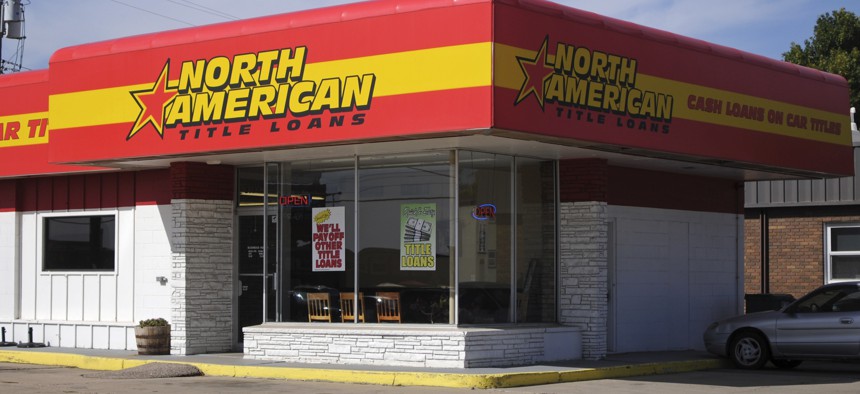Interest Rate Cap on 'Payday Loans’ Yields Positive Results, Group Says

This Sept. 30, 2016, photo, shows a North American Title Loans location in Sioux Falls, S.D. (AP Photo/James Nord)
South Dakota imposed the 36% cap under a 2016 ballot measure. At least 15 other states have similar limits on the books.
A South Dakota law capping interest rates at 36% for “payday loans” is working out well for consumers and communities in the state, a new report says.
The Center for Responsible Lending found that with the interest rate limit in place, people have access to lower-cost borrowing options for meeting cash shortfalls and that “productive businesses” are moving into storefronts once occupied by payday lenders.
But the report adds that some borrowers are still facing aggressive debt collections due to loans they took on before the cap.
The cap was enacted under a ballot measure approved in 2016 by 76% of voters. A competing initiative that same year backed by the payday lending industry failed. At least 16 states have imposed these sorts of interest rate limits, the Center for Responsible Lending says.
Before South Dakota introduced its cap, the group says the average interest and fees, or APR, for payday loans in the state reached 574%.
“Voters got what they asked for,” Charla Rios, one of the report’s co-authors, said in a statement.
“South Dakotans understood that payday loans make matters worse for struggling families,” Rios added. “Despite warnings from payday lenders, the sky didn’t fall in South Dakota. In fact, people have much better options than a product designed to trap them in debt.”
In general, payday lending involves lenders making loans without scrutinizing a borrower’s ability to repay, and also obtaining access to their bank account either with post-dated checks or electronic debit authorization. Loan payments are typically due on payday.
The South Dakota law also covers financial products that are related to payday loans, such as “car-title loans,” where a borrower’s vehicle serves as collateral.
Critics of these loans argue that they trap people in unsustainable cycles of paying off debt, where fees and interest can end up dwarfing the original amount borrowed.
A common argument against tighter restrictions on payday lenders is that the regulations will result in fewer options for people who need to borrow money for emergencies or other pressing short-term needs.
But the Center for Responsible Lending says alternatives that are better for consumers—like small-dollar unsecured consumer loans and “payday alternative loans” offered by credit unions—are still readily available in South Dakota. They are also becoming more common, the report says. It points to options like “credit builder loans” from community development financial institutions as well.
South Dakota’s interest rate cap does not apply to national banks, credit unions or state chartered financial institutions.
The Center for Responsible Lending also highlighted examples of former payday loan storefronts that are now occupied by other businesses and organizations, like churches and credit unions, establishments that the group says make more of a positive contribution to local economies.
Polling results for 509 registered Republican voters included in the report show that just over 90% of people who said they voted “yes” on the interest rate cap ballot measure are opposed to state lawmakers passing legislation to allow for higher rates. About 57% of people who said they voted against the measure responded that they didn’t want to see higher rates either.
The report says that federal lawmakers and regulators have failed to take action to prevent high-cost lenders from attempting to circumvent state interest rate caps by partnering with banks in states with less restrictive lending laws.
A full copy of the report can be found here.
Bill Lucia is a senior reporter for Route Fifty and is based in Olympia, Washington.
NEXT STORY: Lawmaker Proposes Harsher Punishments for Rioters in Masks






